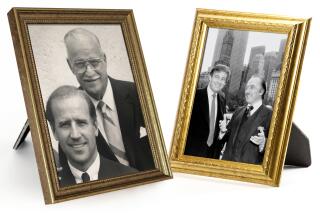A Father’s Day gift: Having the end-of-life talk
- Share via
It was a talk we needed to have, but I didn’t know that until my father’s cardiologist insisted. Here’s how it happened.
In 2002, I took my 83-year-old father to his doctor to discuss the results of some heart tests. My dad’s memory had been failing for several years. Now he was slowing down physically as well.
The doctor seated us in his office and then broke the bad news. My father had a failing heart, and without valve replacement surgery, he wasn’t likely to live more than a year. After the doctor described the surgery, I turned to my dad.
He was clearly skeptical. He had always hated hospitals, and now they were also a reminder of my mother’s death a few years earlier. Wanting to alert the doctor to my father’s failing memory, I asked a question: Could surgery and hospitalization add to disorientation? The doctor picked up on the hint. Was my father having memory problems?
“Only when I try to remember things,” my dad replied, making his standard joke on the subject.
The doctor administered a simple memory test and quickly realized that there was some mental deterioration. So what did my dad think, he asked, about a long hospitalization and recovery?
“I’d rather take my chances.”
Then the doctor did something wonderful. He made us face the future. “You know,” he said, “you might just die in your bed some night without any notice. But that’s not the way most of us go.”
The medical power of attorney my dad had already given his children was a good thing, but it wasn’t enough. “Do your kids really know what your wishes are?” he asked. “If you had a stroke, say, would they know what to tell us about how much medical intervention you’d want?”
My dad pointed to me, saying, “I trust her completely. She’d just know what to do.”
I cut in at that point. I was happy, I told my dad, that he trusted me. But I didn’t know what to do; I could guess, but I’d rather know his wishes.
The doctor suggested we talk it out right there in his office, and he threw out a question to get things started: What if my dad had a heart attack or stroke; under what circumstances would he want intervention?
We discussed it, talking about the possible aftermaths of a medical emergency. If he was going to come out the other side with brain damage or other serious problems, my dad concluded, he’d just as soon not be treated. He’d had a long and happy life. He then got uncharacteristically serious, looking first at me, then the doctor.
“I feel like my heart and my brain are in a race to deteriorate,” he said. “And I hope my heart wins the race.”
Over the next year, despite his wishes, it was beginning to look as if his brain would win the deterioration race. He still knew his family and friends, and he hadn’t lost his personality or sense of humor. But his short-term memory was shot. He was no longer able to take care of his basic needs, and he had to move from assisted living into a nursing facility.
Not long after that, I got a call from a hospital emergency room: My father had just arrived by ambulance in the middle of a serious heart attack. The doctor on call asked how much intervention we wanted. I told the doctor about the conversation I’d had with my father, and then, sobbing, said that I thought it meant he wouldn’t want extraordinary measures taken to keep him alive.
When I got to the hospital 15 minutes later, the doctor approached me. He hadn’t felt comfortable doing nothing based on our phone call. I found my father strapped to a gurney with a catheter, intravenous lines and an oxygen mask.
My dad smiled when he saw me. “If you’ve never had an elephant sitting on your chest,” he said, “I can tell you what it feels like.”
Within minutes, though, he was begging me to get him out of there, or at least to get the nurses to take out “the tubes,” as he called them. I told him they were just trying to stabilize him, but I really felt like he’d become, despite his best intentions, part of the medical industrial complex, and it was going to be hard to reclaim him.
Late that night, the doctor came to the curtained area of the emergency room where my father was still being kept. He asked to speak to me. I went outside with him, and he apologized for not having followed my instructions earlier, saying that he had been listening all afternoon as my father and I talked, and he realized how close we were. Without knowing that, he said, he just hadn’t felt comfortable following my instructions despite my medical power of attorney. “I see a lot of dysfunctional families,” he said. But from that point on, he promised, only palliative care would be provided.
Two days later, my father died. His heart had won the race.
Talking about death may not seem like the ideal conversation to celebrateFather’s Day, but having that conversation might just be a true gift — for fathers and children. If you don’t know your father’s feelings about end-of-life issues, consider broaching them today. And if you’re a father, make it easier on your kids by bringing up the subject yourself.
I still miss my father immensely. But at least I knew at the end what his wishes were.
Sue Horton is The Times’ Op-Ed editor. [email protected]
More to Read
A cure for the common opinion
Get thought-provoking perspectives with our weekly newsletter.
You may occasionally receive promotional content from the Los Angeles Times.











